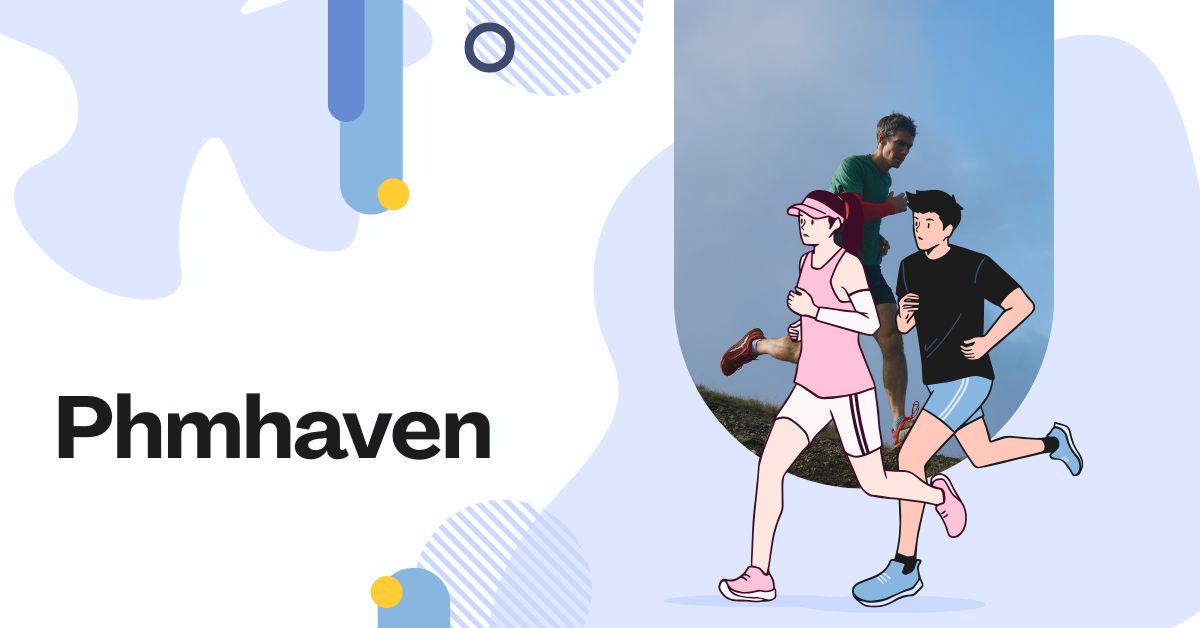Health
Cymbalta Ruined My Life: A Personal and Eye-Opening Story

Health
Phmhaven: The Future of Digital Wellness and Innovation

In today’s technology-driven age, where digital overload and burnout have become common, Phmhaven emerges as a refreshing concept dedicated to digital wellness and innovation. It represents more than just a platform—it’s a movement toward healthier, more mindful digital living. Phmhaven seeks to balance the intersection between human connection, technology, and mental well-being, making it a cornerstone for the future of digital harmony.
What Is Phmhaven?
Phmhaven is a digital ecosystem designed to promote mental wellness, creative collaboration, and innovative interaction in the online world. It stands as a virtual refuge where users can engage meaningfully with technology while maintaining emotional and psychological balance. The name itself—“Phmhaven”—symbolizes a personal haven in the digital realm, where peace meets progress.
The Philosophy Behind Phmhaven
The philosophy of Phmhaven revolves around conscious technology use. Instead of promoting endless scrolling and distraction, it emphasizes mindful engagement, purposeful creation, and community-driven innovation. It aligns with the growing need for platforms that respect users’ mental health and promote positive online behavior.
The Rise of Digital Wellness
Digital wellness has become a global concern. With constant notifications, social pressure, and the race for online validation, users are more connected yet lonelier than ever. Phmhaven addresses this by creating digital experiences that nurture emotional health, reduce stress, and encourage authenticity—helping individuals reconnect with themselves even while being online.
Innovation with a Human Touch
Phmhaven merges innovation with empathy. Its approach is rooted in human-centric design, ensuring that technology serves people, not the other way around. Every feature, algorithm, and tool within Phmhaven is built to enhance user happiness, productivity, and purpose. It’s not about “more screen time,” but “better screen time.”
How Phmhaven Balances Tech and Wellness
Phmhaven uses smart digital wellness tools that monitor engagement levels, suggest healthy breaks, and promote focused work. Users are encouraged to set boundaries, manage their digital consumption, and maintain a healthy rhythm between online activity and real-life presence. This balance is what sets Phmhaven apart from traditional social or professional platforms.
Phmhaven as a Community of Growth
At its heart, Phmhaven is a thriving community. It brings together creators, thinkers, and innovators who share a common goal—to make the digital world a more conscious and creative space. Unlike platforms that reward superficial engagement, Phmhaven encourages depth, originality, and mutual respect among its members.
AI and the Future of Personal Well-being
Artificial Intelligence within Phmhaven isn’t about surveillance—it’s about support. The AI tools act as digital companions, analyzing patterns to help users improve focus, manage emotions, and enhance creativity. By understanding personal behavior, Phmhaven’s AI delivers personalized wellness insights without compromising privacy.
The Power of Mindful Innovation
Phmhaven’s approach to innovation is deeply mindful. Every new feature undergoes ethical review to ensure it aligns with user wellness and mental balance. Instead of exploiting data or addiction triggers, the platform thrives on transparency, trust, and human benefit. This makes Phmhaven a pioneer in the era of ethical technology.
Empowering Digital Creators
Phmhaven offers a nurturing space for creators to express their ideas without the pressure of trends or algorithms. It empowers artists, writers, and thinkers to share their work authentically, helping them reach audiences that value quality over quantity. Through fair revenue models and transparent sharing systems, it encourages sustainable creativity.
Phmhaven for Businesses and Innovators
For businesses, Phmhaven presents a new paradigm of corporate digital presence—one built on ethics and empathy. Brands can engage with audiences in a stress-free, value-driven environment. Through wellness-centric campaigns and mindful marketing tools, companies can foster deeper emotional connections with consumers.
Technology That Heals, Not Hurts
Unlike many digital ecosystems that promote dependency, Phmhaven’s goal is restoration. It recognizes the psychological impact of overstimulation and seeks to counter it with calming interfaces, intuitive design, and content moderation that encourages positive interaction. It’s where technology becomes a source of healing, not harm.
Privacy and Trust at Its Core
Phmhaven prioritizes user privacy. Its system is built with transparent data policies and encrypted communication, ensuring that individuals remain in control of their digital footprints. The platform respects consent, making it a safe and trustworthy environment for all.
Education and Digital Awareness
Phmhaven also focuses on digital literacy. It offers resources, workshops, and programs to educate users about responsible technology use, emotional intelligence, and mental health in the digital age. This commitment to education reflects its mission to create not just a platform but a movement for digital consciousness.
The Future Vision of Phmhaven
The future of Phmhaven is bright and transformative. Its roadmap includes expanding to wellness-driven AI coaching, immersive relaxation experiences using virtual reality, and deeper integration of mindfulness tools in everyday digital interactions. It envisions a world where technology elevates human life—where screens become windows to peace, not pressure.
Why the World Needs Phmhaven Now
In an age dominated by distraction and digital fatigue, Phmhaven’s emergence feels timely and necessary. It offers hope—a model of what the digital world could be if innovation and wellness coexist. By reimagining how we interact with technology, Phmhaven could very well lead the next revolution in digital humanity.
Conclusion
Phmhaven is more than a platform—it’s a philosophy, a lifestyle, and a revolution in digital wellness. By combining technology, mindfulness, and innovation, it sets a new standard for what digital interaction should feel like: enriching, peaceful, and empowering. As our lives become increasingly connected, Phmhaven reminds us that true connection begins with well-being. The future of technology isn’t just smart—it’s kind.
FAQs
- What makes Phmhaven different from other digital platforms?
Phmhaven focuses on digital wellness and human-centered innovation, prioritizing user well-being over engagement metrics or ad revenue. - Is Phmhaven free to use?
Yes, Phmhaven offers free access with optional premium wellness features for creators and professionals. - How does Phmhaven ensure user privacy?
It uses encrypted systems, transparent data policies, and complete user control over information sharing. - Can Phmhaven help reduce digital stress?
Absolutely. Its tools and design promote mindfulness, healthy habits, and conscious screen usage. - Who can benefit from Phmhaven?
Everyone—from digital creators and entrepreneurs to everyday users seeking a healthier relationship with technology—can benefit from Phmhaven’s approach.
Health
Soutaipasu: Unlocking Your Triceps’ True Potential

The term soutaipasu is the Japanese romanized word for “side triceps,” and it has found a unique home in the global fitness lexicon. It specifically points to the lateral head of the triceps, the part that creates that dramatic, horseshoe-like sweep when it is fully developed and lean. While the name might sound exotic, the concept it represents is universal in bodybuilding and strength training. Focusing on the soutaipasu is about more than just aesthetics; it is about creating a balanced, powerful, and resilient upper arm. When the lateral head is fully engaged, it contributes significantly to the overall thickness and width of the arm, making it appear larger from every angle, not just the front.
Understanding Your Triceps Anatomy
To effectively train any muscle, you must first understand its basic blueprint. The triceps brachii, as the name implies, is a three-headed muscle consisting of the long head, the medial head, and the lateral head. The long head runs along the bottom of the arm and is recruited heavily during movements where your arm is overhead. The medial head lies mostly beneath the others, acting as a stabilizer. The lateral head is the star of our show, the soutaipasu, which runs along the outer part of your upper arm. All three heads converge into a single tendon that crosses the elbow joint, meaning every triceps exercise works all three heads to some degree. However, by manipulating arm angle and grip, we can place a greater emphasis on one head over the others.
The Functional Role of the Lateral Head
The lateral head is not just for show; it plays a vital functional role in upper body strength. This head of the triceps is particularly active during movements that require forceful extension of the elbow, especially when your arms are close to your body. Think about the lockout portion of a bench press or a close-grip push-up; that is your soutaipasu firing powerfully. Its development is crucial for athletes in sports requiring punching, throwing, or pushing motions. A strong lateral head contributes to joint stability and can help prevent injuries related to the elbow and shoulder by ensuring balanced muscular development around these complex joints.
Foundational Principles for Triceps Growth
Before diving into specific exercises, it is essential to grasp the non-negotiable principles that govern muscle growth. Progressive overload is the cornerstone; you must consistently challenge your triceps with more weight, more reps, or more sets over time to force them to adapt and grow. Mind-muscle connection is another critical factor, especially for targeting the soutaipasu. You need to consciously focus on feeling the stretch and contraction in the outer part of your triceps during each repetition. Simply going through the motions with heavy weight will not yield the same detailed development as controlled, intentional movements.
Why Isolation Movements Are Crucial
While compound movements like the bench press and dips are fantastic for building overall triceps mass, they are not always sufficient for bringing out the detail of the lateral head. This is where isolation exercises become indispensable. Movements like overhead extensions excel at targeting the long head, while push-downs and kickbacks can be finely tuned to hammer the soutaipasu. Isolation work allows you to exhaust the muscle with focused tension after your heavier compound lifts, ensuring you stimulate maximum growth across all three heads. It fills in the gaps that bigger movements might miss.
Top Exercises to Target Your Soutaipasu
To carve out that distinct outer sweep, you need a arsenal of effective movements. The rope push-down is a classic for a reason; at the bottom of the movement, as you pull the ropes apart, you are maximizing the contraction in the lateral head. Another exceptional exercise is the straight bar push-down, using a supinated or underhand grip, which places a unique and intense stress on the soutaipasu. For those looking for a different angle, single-arm reverse-grip push-downs with a cable station allow for a deep stretch and a powerful contraction that is hard to replicate with other movements.
Mastering the Overhead Cable Extension
While often associated with the long head, the overhead cable extension can be modified to better engage the lateral head. By using a rope attachment and keeping your elbows flared out to the sides rather than tucked in, you shift a significant portion of the tension. As you extend your arms forward and downward from the overhead position, focus on squeezing the outer portion of your triceps. This variation provides a constant tension throughout the entire range of motion, creating a potent stimulus for growth in the soutaipasu while also providing an excellent stretch.
Programming for Optimal Development
Knowing the exercises is one thing; programming them effectively into your routine is another. Your triceps are already involved in all your pressing work, so they do not require an excessive volume of direct work to grow. A good starting point is to include two to three triceps exercises at the end of your chest or shoulder workout, performing 3-4 sets of 8-15 repetitions. This rep range is ideal for balancing mechanical tension and metabolic stress, two key drivers of hypertrophy. Always start your session with your heaviest compound movements when you are freshest and strongest.
Balancing Frequency and Recovery
Muscles grow when they are resting, not when you are training them. Hitting your triceps, including the soutaipasu, with intense direct work two, or at most three, times per week is sufficient for most individuals. Any more than this, especially when combined with heavy pressing days, can lead to overtraining and potential elbow irritation. Pay close attention to how your elbows feel; if you experience pain, it may be a sign to reduce the frequency, volume, or intensity of your training. Quality sleep and proper nutrition are just as important as the workout itself for facilitating recovery and growth.
Integrating with Your Overall Arm Training
A well-developed arm is a balanced arm. While focusing on the soutaipasu is our goal, neglecting the long head of the triceps or the biceps will result in an incomplete physique. Structure your arm training to include at least one movement that emphasizes the long head, such as a standard overhead dumbbell extension, and a couple of solid bicep exercises. This ensures symmetrical development and joint health. Remember, the triceps as a whole unit contribute far more to upper arm size than the biceps, so giving them priority in your training volume is a smart strategy.
The Mind-Muscle Connection in Practice
This concept deserves reiteration because it is the secret sauce for detailed development. On your final few reps of a soutaipasu-focused set, when the burn is intense, close your eyes and visualize that outer head of the triceps contracting and stretching. Use a lighter weight if necessary to truly feel the muscle working. This neurological connection enhances muscle fiber recruitment, leading to more effective growth over time. It transforms an exercise from a simple mechanical task into a targeted sculpting tool, ensuring your effort translates directly into results.
Conclusion
Building impressive triceps is a science that blends foundational strength training with precise, targeted work. The quest for a defined soutaipasu is not about chasing a fleeting trend but about pursuing a balanced and powerful physique. By understanding the anatomy, applying sound training principles, and executing key exercises with focus and intent, you can unlock the full potential of your triceps. Remember that consistency, proper recovery, and a mindful approach in the gym are what will ultimately carve out that distinct lateral sweep and build the strong, functional arms you are working towards.
Frequently Asked Questions
What does soutaipasu mean?
It is the Japanese term for “side triceps,” referring specifically to the lateral head of the triceps muscle that creates the outer sweep of the arm.
Can I really isolate the lateral head?
You cannot completely isolate it, but you can emphasize it significantly by selecting specific exercises, like rope push-downs and underhand-grip movements, that increase its activation.
How often should I train my triceps?
For most people, training triceps directly 1-2 times per week is sufficient, especially if you are already performing heavy compound pushing exercises.
What is the best rep range for triceps growth?
A mix of rep ranges is beneficial, but focusing on the 8-15 rep range for most of your isolation work is highly effective for stimulating hypertrophy.
Why aren’t my triceps growing?
Common reasons include a lack of progressive overload, poor mind-muscle connection, insufficient recovery, or doing too much volume without adequate intensity.
Health
Contact DrHomeycom: Your Path to Wellness

The decision to seek specialized medical care is a significant step on your health journey. It often comes after much consideration and research, driven by a desire for solutions that are both effective and tailored to your unique needs. In this digital age, finding the right expert requires navigating a sea of information, where credibility and clear communication are paramount. You want a practice that not only understands complex conditions but also values you as an individual. Knowing exactly how to initiate that first conversation is crucial for building confidence from the very start. This is why knowing how to properly contact drhomeycom can be your first move toward a more informed and proactive health strategy. Their approach centers on innovative treatments and personalized patient care, making that initial connection a pivotal moment.
Why Consider Reaching Out to DrHomeycom?
You may be exploring options for conditions that have not responded to conventional treatments, seeking a different perspective on your health. The team associated with this practice specializes in advanced regenerative medicine and biocellular therapies, focusing on the underlying causes of chronic issues rather than just managing symptoms. This methodology appeals to individuals looking for a more holistic and restorative path to wellness, whether they are dealing with age-related decline, joint pain, or low energy. The goal is to optimize the body’s own healing capabilities, a principle that sets their treatment philosophy apart. When you contact drhomeycom, you are taking a step toward a practice that prioritizes long-term vitality. It represents a shift from reactive sick care to proactive, preventative wellness.
Why Your Initial Consultation Matters
The initial consultation is the foundation upon which your entire treatment plan is built. It is not merely a formality but a comprehensive opportunity for the medical team to truly listen to your history, concerns, and wellness objectives. This conversation allows them to gather essential information about your lifestyle, previous treatments, and the specific challenges you face. For you, it is a chance to ask questions, understand the proposed science behind the therapies, and gauge your comfort level with the recommended approach. A thorough first discussion ensures that any subsequent protocol is designed with your unique biological makeup in mind. This personalized attention at the outset is what makes the process effective and tailored.
Why Clear Communication is Essential
Clear and open communication forms the backbone of any successful patient-provider relationship. From your very first interaction, whether it is a phone call or an email, you should feel heard and understood. This clarity ensures that your expectations are aligned with the practice’s capabilities and the realistic outcomes of treatment. It prevents misunderstandings and builds a trusting partnership, which is vital when embarking on complex health interventions. The staff is trained to provide transparent information about procedures, potential outcomes, and associated investments. Effective dialogue empowers you to make confident decisions about your care, knowing you have all the necessary facts.
How to Prepare for Your First Contact
Before you reach out, it is helpful to gather some basic information to make the conversation productive. Have a brief summary of your primary health concern and key medical history points ready, including any major diagnoses or previous treatments you have tried. You might also want to prepare a short list of your main health goals and any questions you have for the team. This preparation helps the staff direct you appropriately and ensures no critical details are forgotten during your discussion. Think about your schedule and potential availability for consultations as well. Being organized demonstrates your commitment and helps streamline the process for everyone involved.
How the Team Processes Your Inquiry
When you contact drhomeycom, your inquiry is typically handled by a dedicated patient coordinator who specializes in these initial conversations. This person acts as your guide, collecting preliminary information and understanding the core reason for your call. They are equipped to answer general questions about the practice’s focus, the types of conditions treated, and the overall process for becoming a patient. Your details are then passed along to the clinical team for a preliminary review, ensuring that by the time you have a full consultation, the doctors are already somewhat familiar with your case. This systematic approach respects your time and ensures a smooth transition into the care pathway.
What Information to Have Ready
To facilitate a efficient initial discussion, having specific details on hand is very useful. This includes your full name and contact information, a concise description of your chief medical complaint, and a list of any current medications or supplements. You should also know the names of any doctors you are currently seeing and have a basic timeline of your health issue. If you have recent lab results or medical reports, having those available for reference can be incredibly helpful. This does not mean you need to recite your entire life story, but key data points allow the team to provide more relevant initial feedback. Being prepared shows initiative and helps maximize the value of your first interaction.
What to Expect After Making contact drhomeycom
Following your initial point of contact, you can expect a responsive and structured follow-up process. A patient coordinator will likely reach out to schedule a more in-depth consultation, which may occur over the phone or via a secure video platform. You will receive information about the practice, its philosophies, and what the next steps entail, often accompanied by relevant forms or intake documents. The team aims to make you feel informed and comfortable before any commitments are made. This phase is designed to educate and prepare you, ensuring there are no surprises as you move forward. It is a deliberate process that prioritizes your understanding and readiness.
When is the Right Time to Reach Out?
The right time to contact a specialist is when you feel that your current health strategies are no longer yielding the results you desire. It is when you are frustrated with simply masking symptoms and are eager to investigate the root causes of your health challenges. If you are experiencing persistent issues like fatigue, joint discomfort, or cognitive fog that impact your quality of life, that is a clear signal to explore new options. You do not need to wait for a crisis; proactive health management is often most effective when started early. Seeking expert guidance is a sign of taking control of your wellbeing. Delaying often only allows underlying conditions to become more entrenched.
When to Explore Alternative Treatments
Considering alternative treatments often becomes relevant when conventional medicine has provided limited answers or you are seeking complementary approaches. If you have tried standard protocols without success, or if you are interested in therapies that harness your body’s innate healing mechanisms, this is a valid path to investigate. It is particularly suitable for individuals who prefer a more natural, cell-based approach to restoration and anti-aging. The decision to explore these options signifies a shift toward a more participatory role in your own health. It is about choosing a path that aligns with a holistic view of wellness. This exploration is a proactive choice for those looking beyond the ordinary.
Conclusion
Initiating contact drhomeycom with a specialized medical practice is a decision that holds the potential to significantly redirect your health trajectory. It is an act of self-advocacy, signaling a commitment to finding solutions that are as unique as you are. The process from that first point of contact to a fully personalized treatment plan is designed to be educational, supportive, and transparent. By choosing to reach out, you are not just seeking a medical intervention; you are embarking on a collaborative partnership focused on achieving sustainable wellness. The clarity and purpose built into their system are there to empower you at every turn. Your journey toward enhanced vitality begins with that single, confident first step.
Frequently Asked Questions
How soon can I expect a response after I contact drhomeycom?
You can typically expect a response from their team within one business day. They prioritize new patient inquiries and aim to connect with you promptly.
What is the main focus of the treatments offered?
The primary focus is on regenerative medicine and biocellular therapies designed to address the root causes of age-related and chronic conditions to restore function and vitality.
Do I need a referral from my current doctor?
A referral is not typically required to schedule a consultation. You can contact them directly to begin the process and discuss your health concerns.
Are these treatments covered by health insurance?
Most regenerative medicine treatments are considered elective and are not covered by insurance. The financial team will provide clear cost information during your consultation.
What if I have more questions after the initial call?
The patient coordinators are available to answer any follow-up questions you have. They ensure you feel completely informed before moving forward with any treatment plan.
-

 Sports9 months ago
Sports9 months agoThe Ultimate Guide to Ski and Snowboard Equipment, Ski Equipment Rental, and Snowboard Equipment Rental
-

 General12 months ago
General12 months agoStart-094: Unlocking Its Secrets and Understanding Its Power
-

 Entertainment1 year ago
Entertainment1 year agoHulu Error Code Rununk13: A Complete Guide
-

 Entertainment11 months ago
Entertainment11 months agoSoaper.tv: A Comprehensive Guide to Your Streaming Companion
-

 General9 months ago
General9 months agoWindstream Email: Features, Setup, and Troubleshooting
-

 Technology1 year ago
Technology1 year agoWhy SBCodez is the Go-To Resource for Aspiring Coders
-

 Games10 months ago
Games10 months agoPizza Edition Games: The Ultimate Guide to Fun and Flavor
-

 Uncategorized10 months ago
Uncategorized10 months agoOceanofPDF: Free eBooks Source or Copyright Violation?
